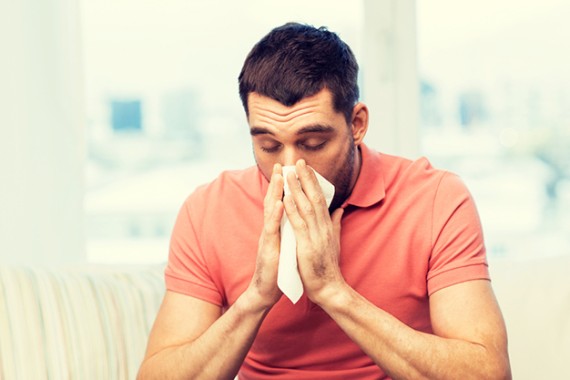How to Cure Allergic Rhinitis Permanently at Home?

Before delving into curing and maintaining rhinitis, we should also focus on what rhinitis is. Rhinitis is defined as “nose irritation.” The mucus is a fluid produced by the nose. Usually, this fluid is thin and transparent. It aids in the removal of dust, dirt, and allergies from the lungs. Mucus catches particles like dust and pollen, bacteria and viruses.
Normally, mucus flows down the back of your throat. When irritated, the nose may produce extra mucus, which thickens and turns pale yellow. The mucus may begin to flow from the nose’s front and rear. Mucus contains substances that can irritate the back of the throat and induce coughing. When additional mucus drips down the back of the throat, this is called a postnasal drip.
Symptoms of rhinitis include:
- Itching in the eyes and nose
- Sneezing
- Nose congestion
- Runny Nose
- Phlegm (mucus) in the throat (postnasal drip)
Allergies can affect everyone, but they often begin after three, peak in late childhood or adolescence, and fade in maturity. Symptoms may start in February and linger until the end of September, depending on your area and allergen. Antihistamines and steroid nasal sprays can provide relief, but some natural remedies can also help out. Here are some of the effective seasonal allergy home treatments to try.
Honey
Honey is a multifunctional kitchen product that can be used to cure health ailments as well as included in your beauty care routine. According to one study, consuming lots of honey will help cure allergic rhinitis symptoms. To produce a delightful and effective tonic, consume one tablespoon of honey directly or combine it with a cup of warm water. Adding a little honey to your cup of herbal tea might also help with allergic reactions. This home cure will undoubtedly treat your allergic reaction in minutes. Honey is cheap and widely available on the market.
Butterbur
The butterbur shrub grows in Asia overall. It has long alleviated pain, headaches, fevers, and digestive problems. It has recently been used to treat urinary tract infections, headaches, migraines, and hay fever. Butterbur has also been the subject of scientific research, with encouraging outcomes. According to one study, this plant functions similarly to Zyrtex, a prescription allergy medicine. Extracts from the root, rhizome, or leaves are used in butterbur products. Therefore, this herb should not be consumed uncooked since it contains alkaloids (PAs) that are toxic to humans. Therefore, always choose products that are labelled as PA-free.
Ginger
Ginger is a common ingredient in every household because it is utilize in various recipes. The ginger extract is well-known for its anti-allergen and anti-inflammatory properties, which can be beneficial in treating severe and cure allergic rhinitis. It can help to reduce congestion while also relaxing your throat. Ginger is readily incorporat into your diet through drinks and other dishes. It is even advantageous to drink a warm cup of ginger water first thing in the morning.
Nasal irrigation
Nasal irrigation, often known as a nasal rinse, is commonly used by allergy sufferers with respiratory problems. It is a natural medicine that uses saline water to clear the nasal passages. Nasal saline irrigation is one of the most effective treatments for nasal obstruction because it rinses the nasal canal and softens the mucus for expulsion.
Inhaling Steam
Steam inhalation moistens and loosens the irritating mucus in your nose canal, making it simpler to blow out. Steam inhalation effectively treats allergic rhinitis symptoms such as nasal congestion, sore throat, runny nose, nasal itch, eye irritation, watering, and sneezing. One of the best ways to cleanse your nose is to use steam. Even a doctor will advise you to steam your sinuses if you have a sinus infection. Add two to three drops of eucalyptus or peppermint essential oil to a boiling water bowl. Then, cover your face with a cloth and turn to face the bowl. Inhaling the steam will aid in the treatment of allergic rhinitis.
Vitamin D
Vitamin D insufficiency has also been linked to allergic rhinitis, asthma, eczema, and anaphylaxis. This vitamin is essential for immune system cell maintenance and releasing molecules that might cause allergic symptoms. As a result, you should consume plenty of Vitamin D-rich foods to treat and prevent allergic rhinitis. These foods include milk, eggs, and meat, which you can obtain by getting adequate sunlight. Taking vitamin D meals not only helps with allergic reactions but also improves overall health.
Therefore, Cure Allergic rhinitis is a chronic illness that can only be controlled and hopefully cured. Without effective treatment, living with this respiratory condition can harm your everyday life. Even though pharmaceuticals are the primary treatment for allergic rhinitis, natural remedies and body and mind techniques are also accessible and workable. These pharmaceutical and non-pharmacological therapies, rather than treating the ailment itself, give symptomatic relief from allergic rhinitis. Therefore, Healing Miracle is here to help you with natural remedies that can go a long way in treating allergies.

